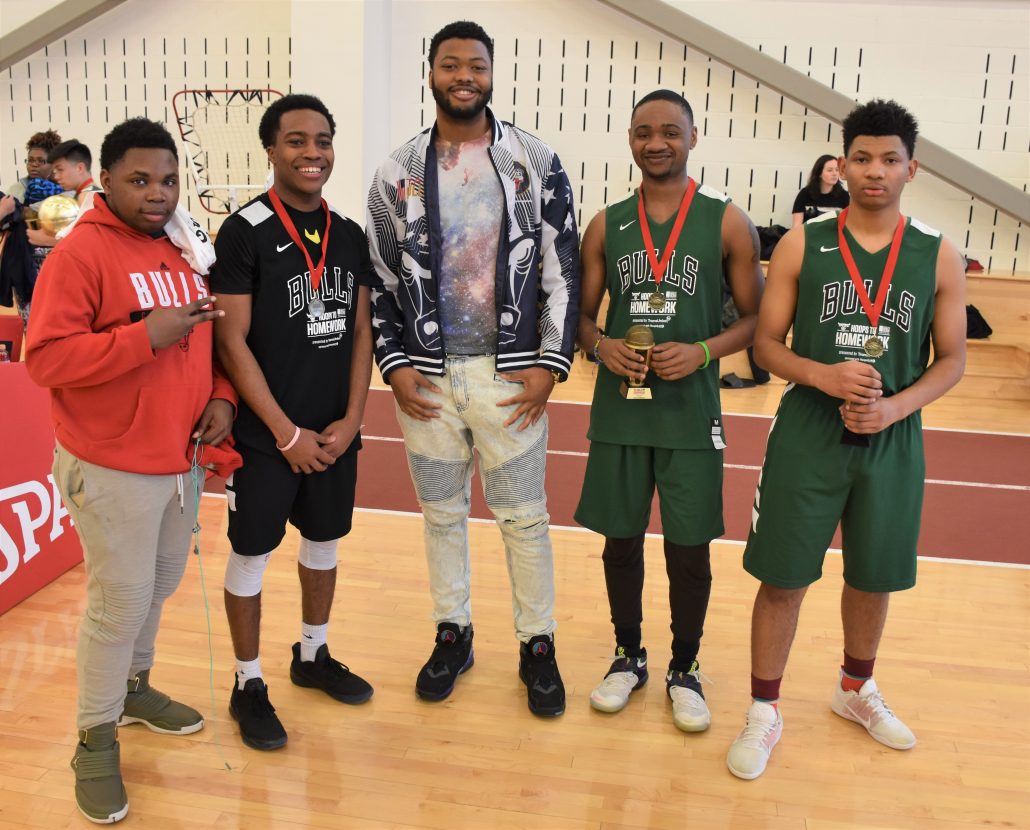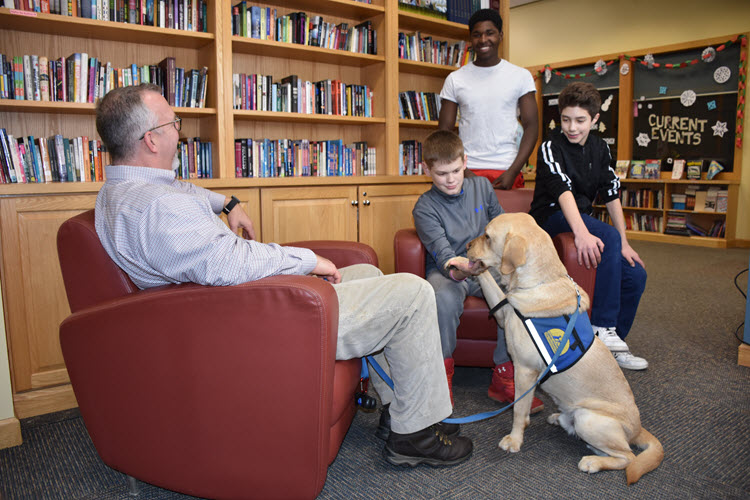Paying It Forward: Celebrating Gratitude This Thanksgiving
Our young people marked Thanksgiving week with spiritual celebrations at both of our locations and meals featuring all the classic...
December 3, 2025
June 15, 2018
As Coordinator for Post-Secondary Options and Career Resources, Justin helps our young people navigate life after high school, but he often fulfills an even deeper role.

Around 94 percent of our kids come from single-parent households where, more often than not, fathers are not in the picture. Fortunately, at Mercy Home, there are many coworkers who serve as father figures for our kids.
On that roster of positive male role models, Justin Earls stands tall. As Coordinator for Post-Secondary Options and Career Resources, Justin helps our young people navigate life after high school, steering them toward vocational programs as an alternative to college.
But outside of his primary responsibilities, Justin fulfills an even deeper role – one that makes it easy to see why he’s a great role model for our kids, especially our young men.
Kids look up to Justin, quite literally. As a 6-foot-7-inch former basketball player for Eastern Illinois University, Justin is a natural fit as head coach of Mercy Home’s basketball team that plays in the Illinois Inter-Agency Athletic Association. The league organizes sport and recreational events that focus on improving the social, psychological and physical well-being of youth residing in residential treatment homes throughout Illinois.
Justin, along with other coaches, taught the boys how to be a good friend and a good person. At first, he said, many guys were only concerned with ‘me, myself, and I.’
“I showed them the importance of the collective unit – that these people, your teammates, are like family,” he said. “Being able to see them learn that throughout the season was amazing.”
Off the court, however, is where Justin really shines. Because he’s fostered such a good rapport with many of our Home’s young men, residential program managers count on Justin as a go-to coworker to deliver fatherly advice when needed. Why? Because when Justin speaks, the young men listen.
Most notably, Justin led group discussions on race and ethnicity, and respecting women.
“We talked about growing up as a black man in Chicago – things you need to be aware of and what to be on the lookout for,” he said. “We talked about how to respect women: proper ways you’re supposed to act and things you’re not supposed to do in front of women if you’re a respectable man.”
Ideally, Justin says, kids learn respect by witnessing a healthy relationship between parents.
“You see that in the household – how your father respects your mother,” he said. “But, growing up, a lot of our kids didn’t have a father in their life, so they didn’t get to see that dynamic.”
But growing up without a father creates other gaps, too. For example: just being around a large, physical presence – someone who makes a kid feel safe and secure.
That’s where Vice President of Youth Programs Tom Gilardi comes in.

Tom is equal parts former linebacker and teddy bear – a loud, burly father and a grandfather figure who gives off a boisterous and contagious energy. Kids naturally gravitate toward spending time with him. Also, kids know that Tom is one half of a dynamic duo – his sidekick being Mercy Home’s beloved facility dog, Pongo.
Tom recalls visiting one young man who was having a difficult time at Mercy Home.
“This kid really connected with Pongo. Then he connected with me a little bit more,” Tom said. “He requested to spend more time with Pongo, but really, he wanted to spend time with me, as a father figure or grandfather figure. That’s invaluable.”
While wisdom and presence are big parts of a father’s job, so too is teaching practical skills as boys mature into young men.
Youth care worker Peter Aiura remembers one such moment.
“One of our guys asked me to help teach him how to shave,” he said. “That’s one thing that dads do for their sons.”
Peter, who has a background in auto-racing mechanics, also leads automotive service workshops for kids at Mercy Home where they learn skills in car maintenance and repair, like changing a vehicle’s oil. Peter said the shaving moment reminded him of a Norman Rockwell painting.
“I know that a lot of our guys are wounded by fatherlessness, and I think it was no more apparent than in that moment that this kid didn’t have anyone to show him how to shave,” he said. “I was honored to be the person that he asked – to do the thing that should have been done by his dad.”
By projecting their experience and knowledge, fathers – and father figures – impart life lessons and skills upon kids. But sometimes, saying nothing at all and merely listening is just as powerful as any grand gesture.
“A lot of what I do is about giving the kids reassurance and letting them know I’m listening,” said Justin. “That’s what many of our kids are missing – the feeling that they’re being heard, especially by someone who looks like them. I let them know that I’ve walked through the same doors, in the same shoes as them. I understand what they’re going through.”
One of Justin’s mentees, Willie, will soon be graduating from Silver Fork, a culinary arts and job readiness program that Justin helped secure.
“Willie is one of the youth who I probably have the closest relationships with. Our relationship kind of built off basketball,” Justin said. “I’ve tried to take him under my wing because I see a lot of myself in him. I want to make sure he goes down the right path.”
But finding the right path, Justin says, is not without detours and obstacles underfoot.
“I let Willie know it’s OK to fail and make mistakes in life. But getting over that hump – that’s where you’re able to grow and learn,” Justin said. “We talk constantly – about dating, school, careers, and life in general. A lot of it’s about right and wrong decisions.”
When asked about his mentor, Willie’s face lights up.
“Justin’s great! He’s helped me so much,” said Willie. “He’s always there if I need someone to talk to.”
Our young people marked Thanksgiving week with spiritual celebrations at both of our locations and meals featuring all the classic...
December 3, 2025
As people traveled near and far to be with loved ones this Thanksgiving, we hosted a special celebration for Community...
December 3, 2025
On November 19, the Ambassadors of Mercy board, along with friends and families who volunteered, packed 130 meal kits for...
December 3, 2025
Comments